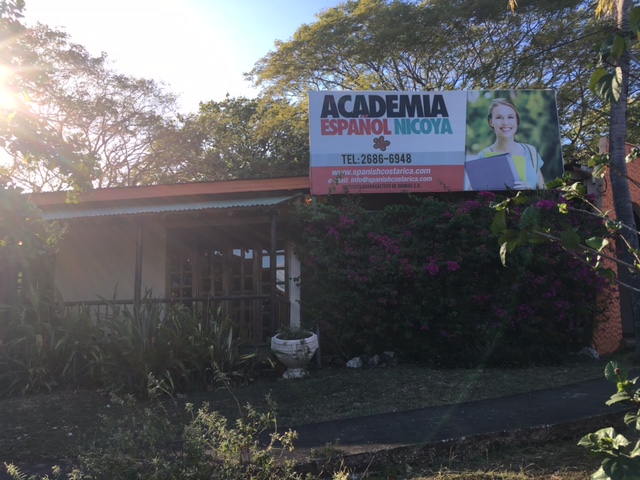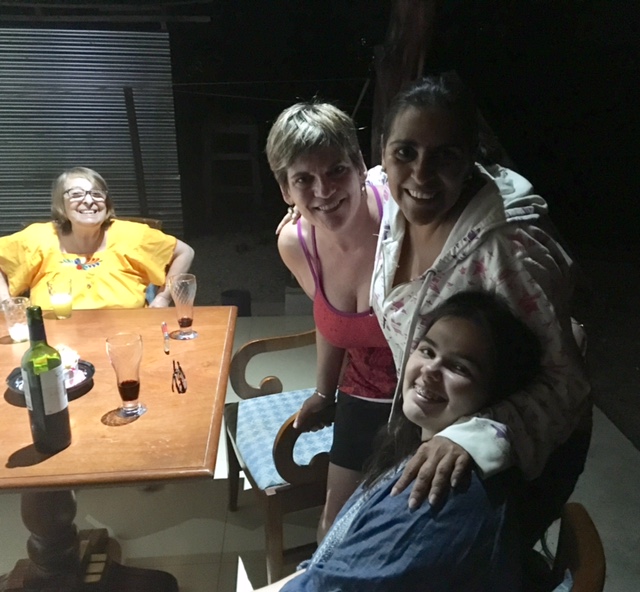When I walked by the Liceo de Nicoya, Costa Rica and read Educación De Calidad Para Un Futuro Major above the door I felt particularly appreciative that I’ve embraced studying the Spanish language and taken the risk to go deeper in understanding through a Latin American language immersion experience. My two weeks at the Academía de Español Nicoya continues the learning I began two years ago with Professor Mark Schafer’s Spanish 101 class. Why? It is tremendously important to me to keep learning and I hope to teach Latino children in the future. So at 52 years old I joined a group of undergraduates to learn a new language. They could be my children, but in the classroom context we are on the same journey of comprehending something entirely new, daunting, inspiring. They celebrate my 85s and commiserate over my C minus notas (grades). And I support them likewise, as they balance courses and waitressing and other demands. We are in this together, especially after the obligatory language requirement levels.
 When I emailed Professor Schafer about enrolling, he responded, “Great! You should know that it’s a challenging course, with a lot of grammar and vocabulary.” There is more than a boat load of grammar and new words. But he was gentle and demanding at once and I stuck to it and continued to Spanish 102 with him. Last fall I progressed to Spanish 201 with Professor Mraz. She delighted me with her enchanting take on language and culture and her use of technology to impart knowledge. Now I’m in Spanish 202 with Department Chair Nino Kebadze whose enthusiasm for Spanish is more than contagious. But before coming to Costa Rica to this Spanish immersion program, I continued to talk with my hand near my mouth so that it would capture all my oral flubs.
When I emailed Professor Schafer about enrolling, he responded, “Great! You should know that it’s a challenging course, with a lot of grammar and vocabulary.” There is more than a boat load of grammar and new words. But he was gentle and demanding at once and I stuck to it and continued to Spanish 102 with him. Last fall I progressed to Spanish 201 with Professor Mraz. She delighted me with her enchanting take on language and culture and her use of technology to impart knowledge. Now I’m in Spanish 202 with Department Chair Nino Kebadze whose enthusiasm for Spanish is more than contagious. But before coming to Costa Rica to this Spanish immersion program, I continued to talk with my hand near my mouth so that it would capture all my oral flubs.My school is located in Nicoya, Costa Rica, comprised of four “parroquiales” which are located in an area named Guanacaste, the majority of which is a fat peninsula facing the Pacific Ocean. I am studying in a town in the center, Nicoya, a simple place, with modest homes, and cold showers that are balanced by incredibly warm inhabitants: the Guanatastecos. Rocking in the chairs on the school’s veranda, we face an elementary school echoing with children’s laughter.
I study with another student or one on one with various teachers — four hours in the morning — and two in the afternoon. Occasionally, a few monos (monkeys) will swing by, but I focus on the language, rather than the remarkable flora and fauna in this lovely country. Learning to speak a foreign language is the Boston Marathon of humility, mile after mile, with Heartbreak Hill moments. But there are victories: I no longer cover my mouth while expelling verb conjugations. I am starting to speak more naturally!
I live with a family of three, an abuela (grandmother), a mamá (mother), and a 14 year old hija (daughter). La abuela does not speak English, la mamá speaks pretty well, and la hija almost perfectly. Dogs and cats roam the streets, men with little carts attached to bikes are Nicoyan “Ice Cream Trucks,” and men encircle you selling news print lottery tickets. Might I win? I’ll stick with the Mass State Lottery.
Finally, I am grateful that my family and work colleagues have allowed me to take this leap in learning. I’m convinced that the education I am receiving is de calidad and hope that my use of it will somehow bring about Un Futuro Mejor.
¡Pura Vida!
—Nanette Cormier


